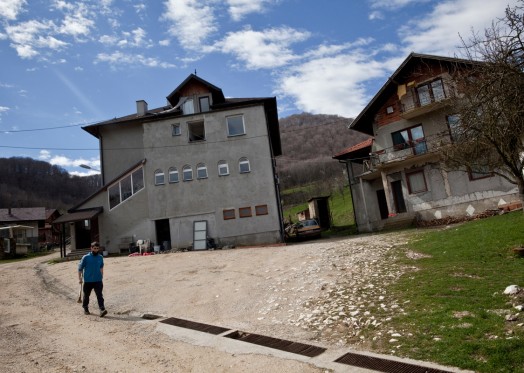Balkan connection

“We don’t like journalists” he says with a sharp American accent. “You come here just to fit us in your already written story”. The sturdy man in a long robe who confronts me at the entrance of Gornja Maoca, a small mountain village in Eastern Bosnia, flaunts a full islamic beard and a wry grin. “You should convert to islam” he cuts short, and desappears in the mosque. The flags of the Caliphate were taken down from the barns and the stone houses by the police last month. But the isolated hamlet is well known to be a stronghold of a radical sunni wahhabi community: it was raided several times and 16 Bosnians were arrested here last September for funding terrorism, recruiting and joining jihadi groups fighting in Syria and Iraq. It is believed 200/300 Bosnians are currently fighting with the Caliphate.
Hundreds of muslims flocked to Bosnia during the Balkan wars, including radicals such as Khalid Shaikh Muhammad, mastermind of the 9/11 attacks. In 1992 they formed a brigade, the Katibat al-Mujahiddin, based in Zenica, and when three years later the Dayton peace accords brought an end to the conflict they didn’t pack up and leave: most were granted the Bosnian citizenship, married local women and settled in remote villages like Gornja Maoca, spreading their radical faith and building a network of sharia-run enclaves that serve as recruiting stations for new converts and safe havens for jihadis from all over the world. Mevlid Jaserevic, the October 2011 attacker of the US Embassy in Sarajevo, had spent some time in Gornja Maoca. Bilal Bosnic, who played a pivotal role in recruiting fighters in Italy, Belgium and Germany, was arrested here. And Edis Bosnic, the man who wants me to convert, was already known to the FBI in 2004, when he lived in Jacksonville, Florida, and was in touch with salafi preachers in the US and Europe. Austria is at the crossroads of the jihadi Balkan connection: according to the Interpol Muhammad Fadil Porca, imam of the al-Tahwid mosque in Wien, is actively promoting the transfer of European would-be fighters to the battlefields in the Middle East. No wonder that most cars in Gornja Maoca carry Austrian plates.
The islamist propaganda finds a fertile ground in a country with a 44 per cent unemployment rate and a 430 euros average wage. The Caliphate ensures a house, a good salary and a bonus for every wife and son. Foreign fighters are believed to earn as much as 1,000 dollars a month. And the one way ticket Sarajevo-Istanbul-Gaziantep, the closest airport to the Syrian border, is just 100 euros.





